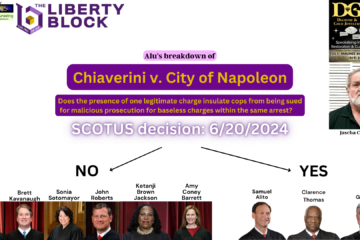In honor of the great loss of Walter Williams on December 1st, we are publishing a few of his best quotes. Williams explained capitalism and freedom as well as anyone else I could think of.
20) “Prior to capitalism, the way people amassed great wealth was by looting, plundering and enslaving their fellow man. Capitalism made it possible to become wealthy by serving your fellow man.”
19) “During the first Reagan administration, I participated in a number of press conferences on either a book or article I’d written or as a panelist in a discussion of White House public policy. On occasion, when the question-and-answer session began, I’d tell the press, ‘You can treat me like a white person. Ask hard, penetrating questions.’ The remark often brought uncomfortable laughter, but I was dead serious. If there is one general characteristic of white liberals, it’s their condescending and demeaning attitude toward blacks.”
18) “In a free society, government has the responsibility of protecting us from others, but not from ourselves.”
17) “What human motivation is responsible for getting the most wonderful things done? I would say greed. When I use the term greed, I do not mean cheating, stealing, fraud, and other acts of dishonesty, I mean people seeking to get the most for themselves. One might be tempted to use ‘enlightened self-interest’ but I like greed better. Unfortunately, many people are naive enough to believe that it is compassion, concern, and ‘feeling another’s pain’ that’s the superior human motivation. As such we fall easy prey to charlatans, quacks, and hustlers.”
16) “I believe that reaching into your own pockets to help someone in need is praiseworthy and laudable. Reaching into somebody else’s pockets to help your fellow man in need is despicable.”
15) “Most people agree that slavery is immoral. But what makes it so? Slavery denies a person the right to use his property (body) and the fruits of his labor the way he sees fit. Slavery forcibly uses one person to serve the purposes of another. Tragically, most Americans, including blacks, whose ancestors have suffered from gross property right violations, think it quite proper that one person be forcibly used to serve the purposes of another.”
14) “Market capitalism is the best thing that ever happened to the common man. The rich have always had access to entertainment, often in the comfort of their palaces and mansions. The rich have never had to experience the drudgery of having to beat out carpets, iron their clothing or slave over a hot stove all day in order to have a decent dinner. They could afford to hire people. Capitalism’s mass production and marketing have made radios and televisions, vacuum cleaners, wash-and-wear clothing, and microwave ovens available and well within the means of the common man; thus, sparing him of the boredom and drudgery of the past. Today, the common man has the power to enjoy much (and more) of what only the rich could afford yesteryear.”
13) “What we call the market is really a democratic process involving millions and in some markets billions, of people making personal decisions that express their preferences. When you hear someone say that he doesn’t trust the market, and wants to replace it with government edicts, he’s really calling for a switch from a democratic process to a totalitarian one.”
12) “The only way Congress can get one dollar to spend is to take that one dollar from Americans, borrow that one dollar from Americans, or inflate that one dollar from Americans. So, it’s very much like the visual image of a swimming pool. A person notes there is a shallow end, so he takes the water out of the deep end and pours it in the shallow end, hoping to raise the height of the water in the pool – and you would call that person stupid.”
11) “The difference between a thief and a congressman: When a thief steals your money, he doesn’t expect you to thank him.”

10) “Government is about coercion. Limiting government is the single most important instrument for guaranteeing liberty.”
9) “In general, presidents and congressmen have very limited power to do good for the economy and awesome power to do bad. The best good thing that politicians can do for the economy is to stop doing bad. In part, this can be achieved through reducing taxes and economic regulation, and staying out of our lives.”
8) “Wealth comes from successful individual efforts to please one’s fellow man…that’s what competition is all about: ‘outpleasing’ your competitors to win over the consumers.”
7) “Poverty in Egypt, or anywhere else, is not very difficult to explain. There are three basic causes: People are poor because they cannot produce anything highly valued by others. They can produce things highly valued by others but are hampered or prevented from doing so. Or, they volunteer to be poor.”
6) “How many times have we heard ‘free tuition,’ ‘free health care,’ and free you-name-it? If a particular good or service is truly free, we can have as much of it as we want without the sacrifice of other goods or services. Take a ‘free’ library; is it really free? The answer is no. Had the library not been built, that $50 million could have purchased something else. That something else sacrificed is the cost of the library. While users of the library might pay a zero price, zero price and free are not one and the same. So when politicians talk about providing something free, ask them to identify the beneficent Santa Claus or tooth fairy.”
5) “What our nation needs is a separation of ‘business and state’ as it has a separation of ‘church and state.’ That would mean crony capitalism and crony socialism could not survive.”
4) “Suppose I hire you to repair my computer. The job is worth $200 to me and doing the job is worth $200 to you. The transaction will occur because we have a meeting of the mind. Now suppose there’s the imposition of a 30 percent income tax on you. That means you won’t receive $200 but instead $140. You might say the heck with working for me — spending the day with your family is worth more than $140. You might then offer that you’ll do the job if I pay you $285. That way your after-tax earnings will be $200 — what the job was worth to you. There’s a problem. The repair job was worth $200 to me, not $285. So it’s my turn to say the heck with it. This simple example demonstrates that one effect of taxes is that of eliminating transactions, and hence jobs.”
3) “We might think of dollars as being ‘certificates of performance.’ The better I serve my fellow man, and the higher the value he places on that service, the more certificates of performance he gives me. The more certificates I earn, the greater my claim on the goods my fellow man produces. That’s the morality of the market. In order for one to have a claim on what his fellow man produces, he must first serve him.”
2) “But let me offer you my definition of social justice: I keep what I earn and you keep what you earn. Do you disagree? Well then tell me how much of what I earn belongs to you – and why?”
1) “Here’s Williams’ roadmap out of poverty: Complete high school; get a job, any kind of a job; get married before having children, and be a law-abiding citizen. Among both black and white Americans so described, the poverty rate is in the single digits.”


